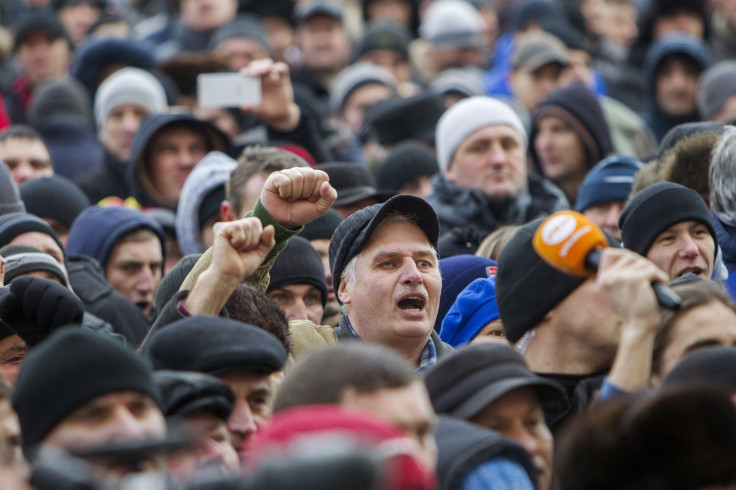Moldova Economic Crisis: How Banking Scandal, Political Corruption Led To Protests In Europe's Poorest Country

A political and economic crisis in the small Eastern European country of Moldova has been worsening daily following the disappearance of $1 billion in a banking scandal, a new government being sworn in under secretive circumstances and a growing budget gap.
As the nearly two-week-old administration of Prime Minister Pavel Filip looks to neighboring Romania and the International Monetary Fund for funds to stave off an economic crisis, the long-term chances of the government’s survival appear slim, with an unlikely union of pro-European Union and pro-Russian parties protesting corruption and political mismanagement in Europe’s poorest country.
“I doubt the government can last more than six to eight months,” said Arcadie Barbarosie, the executive director of the Institute for Public Policy, a think tank in the capital of Chisinau. “There’s no legitimacy and a low level of trust.”
Anger has been building since it was revealed in April that close to 15 percent of Moldova’s gross domestic product of approximately $8 billion disappeared in a massive corruption scandal involving three of the country’s largest banks. Experts now estimate there could be a budget gap of 10 to 15 percent after a GDP contraction of close to 2 percent in 2015 with worries over whether salaries of workers in the public sector will be paid on time. The IMF has described Moldova’s near term outlook as “difficult.”

“The economic situation is getting worse, and people feel that and they need to go out onto the streets and demonstrate against the government,” said Dumitru Ciorici, a Moldovan journalist based in Chisinau. “Now in Moldova the bills are higher, people have another reason to be angry and the government officials have said that they will be having problems making budgetary payments in February.”
The degree of disgust with the government is apparent with the tactics protesters are employing. Activist Anatol Matasaru dropped his pants and sat on a toilet he brought with him in front of the the National Anticorruption Center earlier this week, RFE/RL reported. An unknown person threw a grenade at the home of the central bank governor, officials reported Monday.
Many Moldovans have gone abroad in recent years to find work, with remittances making up more than a quarter of the country’s GDP, according to the World Bank. Neighbor and close ally Romania offered Moldova a $162.5 million loan package to be paid in installments in October 2015. But Bucharest now says it will not fork over the next $65 million tranche unless Moldova undertakes a real fight against corruption, implements reforms targeting the justice sector and signs a draft loan agreement with the IMF, the Associated Press reported.
“In short, they need to go to the IMF and the IMF will point to many stalled reforms, the government will say it’s a very difficult situation to do reforms now and the IMF will insist on this,” said Simeon Djankov, a visiting fellow at the Peterson Institute for International Economics in Washington and minister of finance of Bulgaria from 2009 to 2013. “The IMF is the lender of last resort.”

Wedged between Ukraine and Romania, the country of 3.5 million has had to navigate the pull of the EU and the tug of its former "brother republic" of Russia since it became independent with the breakup of the Soviet Union. Moldova signed an association agreement with the EU in 2014, angering the Kremlin and triggering an embargo on the country’s produce exports. The country’s new government has already called for the resumption of an Inter-Governmental Commission for economic cooperation, the Russian news agency Tass reported.
“Moldova cannot survive in the short term without the remittances coming from Russia and exports to Russia. Also Moldova cannot survive without exports going to the European Union, so somehow it has to strike a balance between two spheres of influence,” said Adrian Lupuşor, the executive director of Expert-Grup, a think tank based in the capital.
With approximately 1,000 Russian peacekeeper troops stationed on the Moldovan breakaway region of Transnistria since it declared independence in 1990, the Kremlin has long kept a watchful eye on the small nation. The massive banking scandal in a country with a monthly average salary of $240 was just the latest example of corrupt practices from parties and leaders that claim to be pro-European. Pro-Russian parties in Moldova have started gaining ground at the polls, with Socialist Party leader Igor Dodon making strident anti-American statements and calling for Moldova to join the Russian-led Eurasian Economic Union.
With its own severe domestic economic crisis, experts doubt Russia will interfere beyond supporting local parties and trying to keep Moldova destabilized.
“The problem is that Moldovans have a poisoned choice to make: You have to choose between an oligarch government that is very corrupt, who participated in the $1 billion theft, who has developed a corrupt system, and it actually took the previous corrupt system and developed it further. And the second is choosing the pro-Russian parties,” said Ciorici, the journalist. “Both of them are bad decisions.”
© Copyright IBTimes 2025. All rights reserved.






















